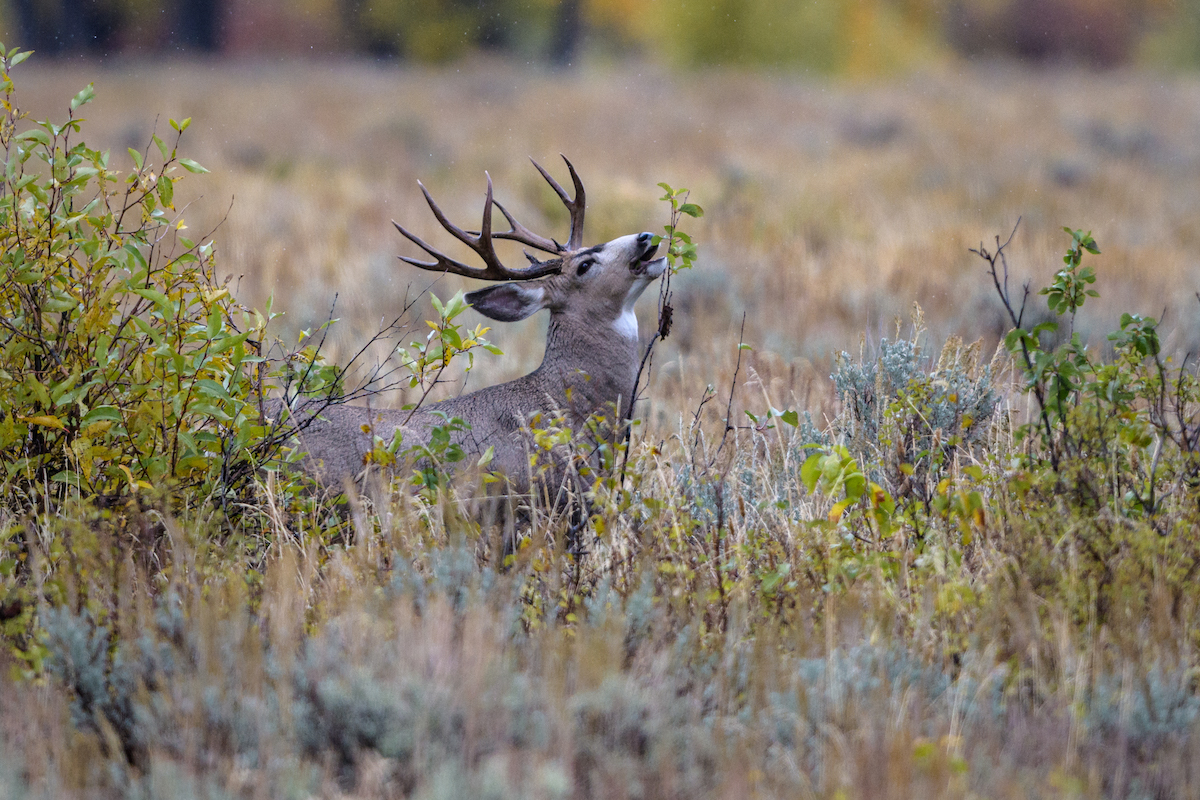Many wildlife photographers will say that “perfect” shots involve luck and being in the right place at the right time. The real trick, said Debbie Tubridy, is observing and interpreting the animals and their signs. It’s a skill she used to capture the foraging mule deer buck that we featured in our 2019 calendar. As an avid and longtime wildlife photographer, Turbidy knew this shot was special.
“Usually animals put their heads up and look right at you, but this guy just continued to reach his head right up to get those leaves,” she said, “as if I weren’t even there.”
The autumn morning the image was taken, Debbie was out on a drive with her husband and a friend. They were just leaving Grand Teton National Park when they came upon the buck.
“It had just finished raining,” she remembered, “and we had gone out to see what we could find. This was one of the last shots I took that day, and it’s the type of scene that brought me out West.”
Although Debbie closely follows the guidelines for wildlife photography — using cars as blinds, approaching cautiously, always giving animals adequate space — her underlying ethic is not to disturb animals.
“They shouldn’t change their behavior because I’m there,” she said. “I want them to act as they are. A lot of my shots are not the close-ups of their faces, but catching them in their natural state and environment. That’s part of the story, and you need to show that.”
Her philosophy is similar to the Wyoming Outdoor Council’s approach to wildlife advocacy — especially around mule deer migration corridors. Science shows that disturbance inside corridors isn’t good for mule deer herds. It’s an issue Turbidy has been following as an Outdoor Council member. She said she wishes more people took responsibility for the impact their decisions have on wildlife.
“That’s why I like to photograph wildlife, because I can help tell the animals’ story, and help show people that we’re all connected. I like to think I’m helping increase people’s awareness and appreciation for animals with my images.”
There is just something special about stopping and sharing a moment with an animal, she said.
“It’s like all time stands still for me. It’s super cool. And I just wish other people could have this same experience — could go and see, touch, feel, understand nature. And then think about the decisions we make regarding wildlife and the environment.”
Debbie and her husband moved to Fruita, Colorado, from southern Florida two years ago after years of traveling West. “I did the math,” Turbidy laughed, “and Fruita was the spot because it was within a day’s drive of all of the places we loved to visit — Wyoming included.”
“There’s a certain amount of truth here,” she said of the West. “People stand up for their values — for the wildlife and landscapes. And, being from populated southern Florida, we love the solitude of the wilderness we find here. The unspoiled beauty that remains in these varied terrains.”
“I just think, if we’re good stewards of the environment, everything else — flora and fauna — also falls into place.”
Join Debbie and other photographers by submitting your own shot of Wyoming for the Outdoor Council’s 2020 Calendar Contest. You can enter your photos via Instagram or email. To submit your photo(s) via Instagram, you must have a public Instagram account so that we’re able to view your submission. Upload your photo(s) and add the hashtag #MyWyoming.
To submit your photo(s) via email, send your photo(s) to claire@wyomingoutdoorcouncil.org.
For more information about the contest, visit our Calendar Contest page.

